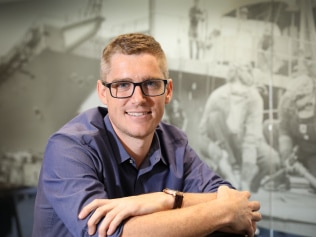Charting a new course
Government investment means South Australian skilled workers can be confident of a strong future

Government investment means South Australian skilled workers can be confident of a strong future
Significant investment in defence, cyber security, health and the space industries means an increase in demand for skilled workers over the next four decades, with today’s apprentices and trainees placed at the cutting edge of tomorrow’s technology.As part of the Australian Government’s $90 billion Naval Shipbuilding Program, two offshore patrol vessels, nine frigates and 12 submarines will be built in South Australia in the next 40 years. The Government will also invest more than $1 billion in modern shipyard infrastructure and up to $62 million in workforce growth and skilling initiatives to ensure the success of the program. One of these initiatives was the launch of the Naval Shipbuilding College in April 2018. The College, based in Osborne, is a joint venture between KBR and Huntington Ingalls Industries, the largest shipbuilding company in the US. It offers a National Workforce Register to connect Australian workers and students with career opportunities, helping to identify the right pathway for each individual.“We are approaching a significant ramp up in the building of naval vessels. Trade workers will be the highest in demand, particularly boilermakers and welders, then through to electricians, sheet metal workers, fitters and machinists,” says Nick Howie, training solutions manager for the Naval Shipbuilding College. “It’s also, in the future, going to involve a lot of technological advances – we work on automation, robotics, and potentially programming might roll into it. It is 40 years of work, so who knows what technology will be available at the end of the project. “When you think about the technological advances of the last 40 years, it could be an opportunity to be right at the cutting edge.”The College is working with industry, the education system, the current workforce and students to create a skilled workforce to meet the needs of shipbuilders tasked with delivering the Royal Australian Navy’s future fleet.“It was identified through our needs analysis that welders going into the industry often didn’t have a lot of experience welding in the types of restricted positions that are encountered in the construction of a naval ship,” Howie says. “The Naval Shipbuilding College, in collaboration with ASC and TAFE SA, was able to drive the creation of a ship section mock-up that incorporates restricted position welding and provides an experience more closely aligned to the shipyard environment. “TAFE SA has incorporated this mock-up in its welding training and it has been rolled out in TAFE QLD, with other states soon to follow.”With such strong government and industry investment, Howie says defence is an industry of and for the future. “All across the country, it’s predicted there will be 15,000 new jobs created; around 5000 in direct shipbuilding,” he says. “Many of those job roles in the small-medium enterprises exist not only in SA but in other states and territories, so it’s a real thriving underbelly of naval shipbuilding that flows right through the community and right through the economy. Students graduating or workers transitioning from other industries can really target those businesses and those jobs of the future.”
For more information, log on to navalshipbuildingcollege.com.au
Lucky number for the future
A leading construction service provider has taken a fresh approach to sourcing skilled workers for one of South Australia’s most innovative redevelopments. The inaugural McMahon Services Demolition Pre-employment program was launched earlier this year in partnership with Renewal SA and with funding from the Department for Innovation and Skills. Offering students four weeks of demolition training, the program included aspects of the Certificate III in Demolition, such as white card, work-zone traffic management, working at heights, and work placement at one of McMahon Services’ numerous demolition sites. One such site is Lot Fourteen, one of the world’s most exciting urban redevelopments based on the site of the old Royal Adelaide Hospital. Sixty-five hopefuls applied for the program, with a lucky 13 making the final cut. At the end of the four weeks, eight participants were invited back to become full-time employees with McMahon Services on a 24-month traineeship, while completing their Certificate III in Demolition. “Some of our participants are working on Lot Fourteen; the rest are on other project sites,” says Lynda Joslin, McMahon Services divisional administrator for demolition division. “Lot Fourteen was the driver to get this initiative in place but we have to have a multi-skilled, variable workforce who can go to different sites and do different things.”For those who complete their traineeship, the career opportunities are as big as some of the projects they can be working on. “There’s so much opportunity and all we’re looking for is young people who want to stay and grow within the company,” Joslin says. “Career pathways from here include site supervisors, project managers, plant operators, crane operators, safety advisers and operators on large heavy machinery and excavators, which you can only use on big commercial sites like Lot Fourteen, AAMI Stadium demolition and other industrial demolition projects.” Spread across 7ha, Lot Fourteen encompasses the future of creation and innovation in South Australia, bringing together corporations, start-ups, researchers, investors and more to nurture new talent and explore exciting new technologies. Minister for Innovation and Skills David Pisoni says The Office of the Chief Entrepreneur, located at Lot Fourteen, is establishing a new model for entrepreneurship in South Australia called FIXE - the Future Industries Exchange for Entrepreneurship, which will connect and build the entrepreneurship ecosystem, and showcase South Australian talent, businesses and ideas. “For example, a local medical diagnostics software company based at Lot Fourteen, Presagen, will be taking its life-changing technology to global markets, thanks to the Government’s $28 million Research, Commercialisation and Startup Fund (RCSF),” Pisoni says. Jim Whalley, South Australia’s first Chief Entrepreneur, says: “Lot Fourteen is going to have a strong focus on people wanting to start up companies in SA. It will give start-up businesses, entrepreneurs, the support, skills and networks they need to start their businesses. “We’re going to have a real emphasis on space, defence, digital and creative industries. Cyber is going to be a great opportunity to take traineeships. We already have some prominent companies lined up to come in, everything from medium-size established companies to large multinationals.”
Reaching for higher ground
A Higher Apprenticeship Program is being launched in South Australia to create a skilled workforce ready to take advantage of the new digital economy. Offered by the Australian Industry Group in partnership with the South Australian Government under the Skilling South Australia initiative, the program aims to create 100 engineering technical apprenticeships in the next four years. With a view to transforming the traditional apprenticeship, Ai Group has partnered with the training sector and defence industry to forge a new vocational educational and training (VET) pathway into defence manufacturing. “(The) Higher Apprenticeships Program is an innovative combination of VET and higher education, where apprentices develop advanced technical skills through theoretical and on-the-job training before graduating with a Diploma in Applied Technologies,” Minister for Innovation and Skills David Pisoni says. “A focus on emerging technologies means that existing mechanical engineering trade units are complemented with the study of robotic systems, cloud-based data and computer aided design tools.”Ai Group is now recruiting participants for the program. “We’re talking to companies right across the board – defence, automation, electronics and mainstream manufacturing,” Stephen Myatt, head of Ai Group in SA, says. The SA program follows a similar successful pilot program run in Melbourne between Ai Group, Siemens and Swinburne University, with two groups of 20 participants. The first group achieved an Associate Degree outcome and most gained full-time employment with Siemens. Three returned to full-time study. The second group finishes at the end of 2019. “The pilot project in Melbourne picked up people right across the board – school leavers, existing apprentices who wanted to build on their knowledge, and existing employees in companies who were looking to get further qualifications in the area of digital transformation,” Myatt says.“Apprenticeships have always been a solid pathway to a career but the world is changing and we need to make apprenticeships more contemporary.”
For more information, call Tim Cornish on 8394 0000.
Skill-based cyber security
Launched as part of the Skilling South Australia initiative, TAFE SA’s Certificate IV in Cyber Security is the first national skills-based certificate-level cyber security qualification. Minister for Innovation and Skills David Pisoni says: “There is growing demand for vocational skills and skills in cyber security more specifically in South Australia, so we need to ensure we have the workforce to fill the positions that will come.”Cyber security student Matt Pisano is one of the first students to enrol on the new course. “It seemed like a very interesting field to go into that’s changing all the time,” he says. “I was looking for something a bit shorter than the full uni course so I saw TAFE as being the best option for me.”
For more information, log on to tafesa.edu.au
10 reasons to choose an apprenticeship or traineeship
1. Earn an income from day one: Yes, apprentices and trainees get paid from the very first day.
2. Learn skills in a real workplace: Never again will you be knocked back for jobs because you “don’t have experience”.
3. Get qualified for life: Learn skills that will be a launching pad for any career you choose.
4. Choose from hundreds of career opportunities: What are you good at? There’s a skilled career for that.
5. Be mentored by experienced colleagues: Their knowledge and skills will put you on the path to success.
6. Build a professional network: Build a professional network that creates opportunities.
7. Career progression: An apprenticeship is a great base from which to build your empire!
8. Avoid uni debt: You can own a car and start saving for a house so much sooner.
9. Thrive in a hands-on job: Get a kick out of making things and helping people.
10. Master your craft: Build your own house. Make your best mate’s wedding cake. Fix your mum’s car. Care for people. Look after the environment. Build a submarine ... whatever it is, your passion could become your career.
Talk to the experts
Learn more about how you can follow your passion – come visit the Adelaide Careers and Employment Expo on Friday, May 10 and Saturday, May 11, at the Adelaide Showgrounds Jubilee Pavilion (stall 14). One of our friendly team will help you explore your options for a skilled career and how you can find a job you love.
For more information, visit careersemploymentexpo.com.au/Adelaide.html
Originally published as Charting a new course



